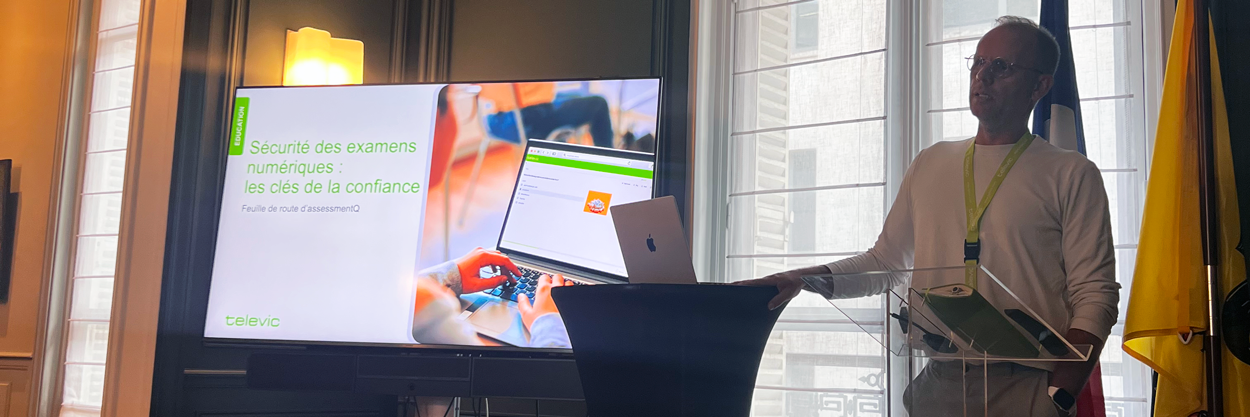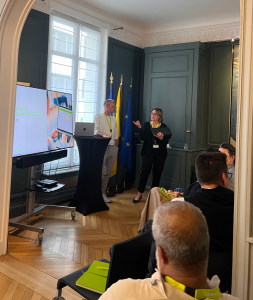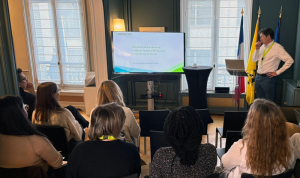
Five key insights from the assessmentQ Experience Day:
Securing high-stakes exams in a changing world
At our recent assessmentQ Experience Day 2025 in Paris, two top experts in exam integrity shared their experiences and best practices: Dr. Andrew Balch, international consultant and former head of test security at IELTS, and Stephanie Poux from our customer CCI Paris Ile-de-France, the certification body behind the Test d’Évaluation du Français (TEF).
Both shed light on a topic that sits at the heart of what we do at assessmentQ: ensuring that every digital exam remains fair, secure, and trustworthy, no matter where or how it’s delivered. Here are their insights, summed up in 5 key takeaways.
1. Why exam security matters more than ever
Security is the foundation of trust. As Andrew put it:
“When someone cheats, it’s not only their score that’s affected, it’s everyone else’s opportunity.”
A single breach in a high-stakes exam can erode confidence among candidates, regulators, and institutions. That’s why leading certification bodies are investing in a 360° approach to exam integrity, from question design to delivery and post-exam validation.
2. The TEF example: global reach, local integrity
 Stéphanie provided a fascinating look behind the scenes of the TEF, a French language test recognized by ministries and governments for immigration, education, and employment purposes.
Stéphanie provided a fascinating look behind the scenes of the TEF, a French language test recognized by ministries and governments for immigration, education, and employment purposes.
- Over 130,000 candidates annually
- 400+ accredited centers across the globe
- Strong partnerships with Alliances Françaises and universities
Security is built into every phase:
- Before the exam: identity verification and exclusion of previously sanctioned candidates.
- During the exam: use of Safe Exam Browser and standardized invigilation protocols in every center.
- After the exam: encrypted result uploads and verification access for government authorities to prevent document falsification.
And even in regions with unstable connectivity, TEF uses assessmentQ’s disconnected mode to guarantee secure offline testing, with encrypted synchronization afterwards.
3. A global view on modern exam fraud
Andrew brought an international lens, highlighting how the cheating landscape has evolved from paper notes to AI-powered networks.
Cheating today involves (a real, non exhaustive list):
- Smart glasses linked to AI assistants,
- Hidden earpieces and vibration signals,
- Remote helpers typing answers live in another room.
“Five years ago, someone could hide under the table during an online test. Today, it’s an industry,” he noted.
He outlined three pillars of modern exam security:
- Exam day protocols: blending human supervision with secure browsers and environmental checks.
- Post-exam analytics: using data patterns, timing, and statistical analysis to flag anomalies.
- Test design security: randomization, item banks, and formats that are harder to memorize or share.
Together, these layers form a holistic defense against fraud and ensure confidence in every result issued.
4. The balancing act: security, validity & candidate experience
 Both experts emphasized a core principle: security can never come at the expense of fairness.
Both experts emphasized a core principle: security can never come at the expense of fairness.
Too many restrictions can make candidates feel distrusted or anxious; too little control risks the credibility of the results. The real challenge lies in finding the right balance between:
- Security, i.e. preventing fraud,
- Validity, i.e. ensuring the test measures what it claims to, and
- Experience, i.e. maintaining trust and accessibility.
At the same time, it’s also an opportunity to find that balance.
5. What we learned
- Exam security is a continuous process, and it always will be.
- True integrity depends on collaboration between platforms, test authors, and certification bodies. It takes a holistic and ecosystem approach.
- Offline or online, security must travel with the exam.
- Balancing fairness, validity, and user experience remains the foundation of credible assessment.
At assessmentQ, we’re proud to work alongside global partners like CCI to make digital exams not only scalable and reliable but worthy of trust.
Thanks again to all participants and speakers for sharing your expertise. Together, we’re shaping the future of secure, fair, and defensible digital exams.


